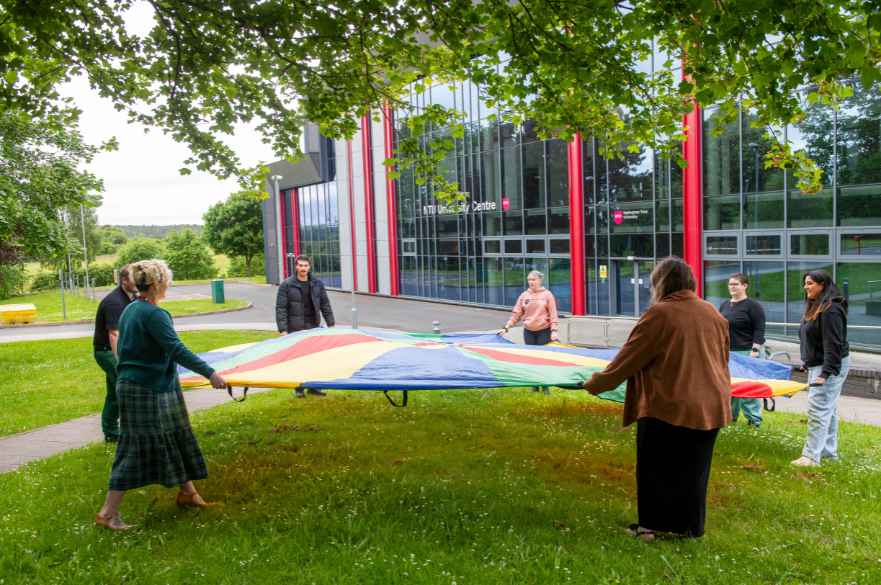Beat the Clearing queue
About this course
The BA (Hons) Education and Professional Practice (Top-up) course is designed for you if you are an FdA Education graduate and want to top up your qualification to BA honours degree level.
This degree will open up a diverse range of career options in the sector, allowing you to make a real difference to the education and development of others.
Taught at NTU in Mansfield, you’ll cover education in its widest sense – both nationally and internationally. You’ll learn how people develop throughout their lives and study how education contributes to society.
Whether you plan to go straight into the world of work on graduating, or this is your stepping stone to further study, you’ll gain the knowledge and transferable skills you need to progress in a diverse range of careers in education.
-
Through workplace or placement opportunities, you’ll gain hands-on experience and develop your confidence as a professional practitioner.
-
On completing this degree, you’ll be well-placed to go straight into the world of work and take up a variety of careers within education.
-
Upon graduating, you’ll have the option of further study, including Initial Teacher Training courses.
-
The course is delivered over 2-3 days a week, allowing you to fit in study around other commitments.
What you’ll study
The course integrates academic and work-based learning through a range of modules. You'll develop an understanding of the broad discipline of education and develop effective communication and organisational skills. You'll also research and critically evaluate learning theories, behaviours, coaching, mentoring and practice.
Full-time students will be required to complete the full 120 credits at level 6 within one academic year.
You will be required to attend one full day, one early evening session per week and a minimum of one day per week (or minimum of 185 hours per year in exceptional circumstances and if agreed with your tutor) placement experience in an educational setting.
If you are already working in an educational setting, you can use your employment as your placement, if your employer agrees to work in partnership with NTU to aid your learning.
Modules:
Education Research (20 Credit Points)
- This module explores the role of education research and facilitates the undertaking of a small-scale systematic enquiry into a key aspect of education.
Educator: Roles and Responsibilities (20 Credit Points)
- This module will explore the roles and responsibilities of an educator within several contexts, considering an array of literature, legislations, and socio-economic matters.
Learning Theories and Behaviour (20 Credit Points)
- Formal educational settings can be difficult for children and young people. Behaviours can manifest in several ways.
- This module invites you to critically explore and define challenging behaviour and its impact on both students and educational practitioners.
Coaching and Mentoring in Education (20 Credit Points)
- What support mechanisms do teachers and support staff have? What impact would an effective mentoring system give?
- This module will explore a range of mentoring and coaching models and draws on theories of adult learning that will help to answer these questions.
Professional Practice Research Project (40 Credit Points)
- This module invites you to pursue an area of your own professional and academic interest throughout the year, within an educational professional context.
- You will attend a work-based placement throughout the course, for a minimum of 1 day per week (or, with the permission of the tutor, 185 hours over the year). You will use this experience to conduct a piece of research and make links to your professional development.
Part-time students will be required to attend one day per week during your first year. In your second year you will attend one evening a week, plus one day per week placement experience in an educational setting (or minimum of 185 hours per year in exceptional circumstances and if agreed with your tutor).
Year One Modules:
Education Research (20 Credit Points)
- This module explores the role of education research and facilitates the undertaking of a small-scale systematic enquiry into a key aspect of education.
Educator: Roles and Responsibilities (20 Credit Points)
- This module will explore the roles and responsibilities of an educator within several contexts, considering an array of literature, legislations and socio-economic matters.
Learning Theories and Behaviour (20 Credit Points)
- Formal educational settings can be difficult for children and young people. Behaviours can manifest in several ways.
- This module invites you to critically explore and define challenging behaviour and its impact on both students and educational practitioners.
Coaching and Mentoring in Education (20 Credit Points)
- What support mechanisms do teachers and support staff have? What impact would an effective mentoring system give?
- This module will explore a range of mentoring and coaching models and draws on theories of adult learning that will help to answer these questions.
Year Two Modules:
Professional Practice Research Project (40 Credit Points)
- This module invites you to pursue an area of your own professional and academic interest throughout the year, within an educational professional context.
- You will attend a work-based placement throughout the course, for a minimum of 1 day per week (or, with the permission of the tutor, 185 hours over the year). You will use this experience to conduct a piece of research and make links to your professional development.
We regularly review and update our course content based on student and employer feedback, ensuring that all of our courses remain current and relevant. This may result in changes to module content or module availability in future years.
Don’t just take our word for it, hear from our students themselves
How you're taught
Flexible study
We've introduced flexible and innovative ways of learning and teaching to develop your study skills and understanding of the integration of theory and practice.
Learning and teaching methods include:
- lectures
- seminar discussions
- practical work
- project work
- workshops.
How you're assessed
The BA (Hons) Education and Professional Practice course has been designed to provide a broad, varied, and consistent range of assessments to ensure a fair and balanced representation of the skills and knowledge you gain throughout. Assessments methods include written assignments, portfolio assessments, group and individual presentations and professional dialogue with tutors.
Contact hours
Your course will be delivered over one full day, one evening session and a minimum of one day per week placement experience in an educational setting.
In exceptional circumstances and with the agreement of your tutor, it is possible to undertake185 hours per year placement experience.
If you are already working within an educational setting, then your placement can be with your employed setting.
Careers and employability
Graduates from this course are well-placed to take up a variety of careers within education and students can go straight into work after their top-up degree.
Graduates of NTU’s BA (Hons) Education and Professional Practice top-up degree have secured roles as:
- Educational Development Worker
- Community Education Officer
- Educational teaching and learning coach
- Educational Project Manager (museums, galleries, or charities).
Graduates have also gone on to study initial teacher training courses, further post graduate learning, Higher Technical Qualifications and apprenticeships.
Employability Team
At NTU in Mansfield, our award-winning Employability team is here to inspire and enhance your career planning, whichever path you choose. Whether you wish to go on to further study or to look for job opportunities, we can guide you to be a successful candidate.
Campus and facilities
As an NTU Mansfield student, you’ll benefit from the latest facilities and modern technology to support your studies and help you get the most out of student life.
We are continually investing in our facilities and enhancing our learning and teaching environment to make it an inspiring place for students.
Facilities and services include:
- University Centre
- Teaching and Learning Centre
- Library
- Dedicated study zones, including PC suites
- On-site café
- Social spaces
- Sports facilities
- Student Support Services
- Nottingham Trent Students Union (NTSU) drop-in events.
Entry requirements
UK students
Completion of the FdA Education degree at NTU or a similar course in Education studies.
To find out what qualifications have tariff points, please use our tariff calculator.
Additional requirements for UK students
You may also need to complete:
- an Enhanced with Barred List(s) DBS check; and
- a satisfactory placement suitability check.
Contextual offers
If you don’t quite meet our entry requirements, we might be able to make you a lower offer based on a range of factors, including your background (such as where you live and the school or college you attended), your experiences and your individual circumstances (you may have been in care, for example). This is called a contextual offer, and we get data from UCAS to help make these decisions. We do this because we believe everyone with the potential to succeed at NTU should have the opportunity to do so, no matter what barriers you may face.
Other qualifications and experience
NTU welcomes applications from students with non-standard qualifications and learning backgrounds, either for year one entry or for advanced standing beyond the start of a course into year 2 or beyond.
We consider study and/or credit achieved from a similar course at another institution (otherwise known as credit transfer), vocational and professional qualifications, and broader work or life experience.
Our Recognition of Prior Learning and Credit Transfer Policy outlines the process and options available for this route. If you wish to apply via Recognition of Prior Learning, please contact the central Admissions and Enquiries Team who will be able to support you through the process.
Getting in touch
If you need more help or information, get in touch through our enquiry form.
International students
This course is not suitable for tier 4 visa applicants.
We accept qualifications from schools, colleges and universities all over the world for entry onto our undergraduate and postgraduate degrees. If you’re not sure how your international qualification matches our course requirements please visit our international qualifications page.
We have undergraduate Education and Teaching courses which are suitable for tier 4 visa applicants. Here is a list of all the undergraduate courses we offer.
Additional requirements for international students
There are no additional requirements for this course.
English language requirements
View our English language requirements for all courses, including alternative English language tests and country qualifications accepted by the University.
If you need help achieving the language requirements, we offer a Pre-Sessional English for Academic Purposes course on our City campus which is an intensive preparation course for academic study at NTU.
Other qualifications and experience
If you have the right level of qualifications, you may be able to start your Bachelors degree at NTU in year 2 or year 3. This is called ‘advanced standing’ entry and is decided on a case-by case basis after our assessment of your qualifications and experience.
You can view our Recognition of Prior Learning and Credit Transfer Policy which outlines the process and options available, such as recognising experiential learning and credit transfer.
Sign up for emails
Sign up to receive regular emails from the International Office. You'll hear about our news, scholarships and any upcoming events in your country with our expert regional teams.
Getting in touch
If you need advice about studying at NTU as an international student or how to apply, our international webpages are a great place to start. If you have any questions about your study options, your international qualifications, experience, grades or other results, please get in touch through our enquiry form. Our international teams are highly experienced in answering queries from students all over the world.
Policies
We strive to make our admissions procedures as fair and clear as possible. To find out more about how we make offers, visit our admissions policies page.








